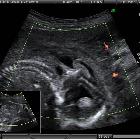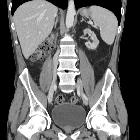cystic renal dysplasia
Cystic renal dysplasia refers to a subgroup of congenital anomalies of the kidney and urinary tract characterized by the dysplastic renal parenchyma and formation of cysts. The most severe form is multicystic dysplastic kidney, in which functional renal parenchyma is absent and only undifferentiated mesenchyme and numerous cysts are present. Milder manifestations are associated with obstructive cystic renal dysplasia.
Pathology
Associations
- urinary tract obstruction, such as ureteropelvic junction obstruction or posterior urethral valves
- vesicoureteric reflux
- various genetic syndromes, such as Meckel-Gruber syndrome
Radiographic features
Ultrasound is the first-line modality for evaluation of pediatric renal cystic disease. Diuretic radionuclide renography (most commonly with Tc-99m MAG3) can be used to rule out an obstruction.
Ultrasound
Cystic dysplasia is characterized by the presence of at least one renal cyst (round, anechoic, thin-walled structure) within an abnormal kidney (eg, hyperechoic parenchyma, absent or reversed corticomedullary differentiation, small kidney size) . The abnormality usually involves the entire kidney but can be localized to one segment of a kidney or one moiety of a duplex kidney.
See also
Siehe auch:
und weiter:

 Assoziationen und Differentialdiagnosen zu cystic renal dysplasia:
Assoziationen und Differentialdiagnosen zu cystic renal dysplasia:


